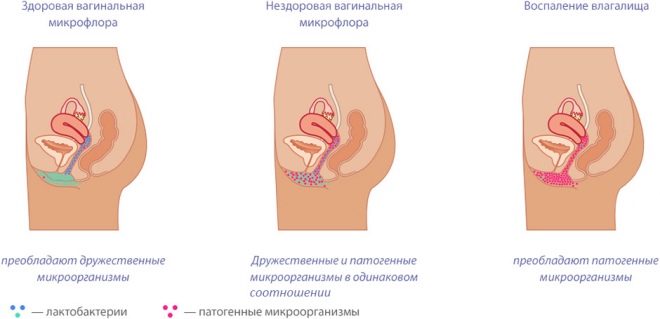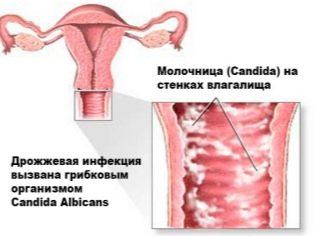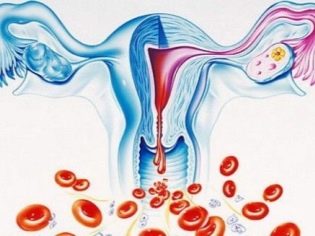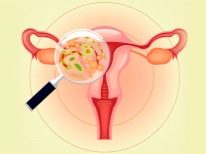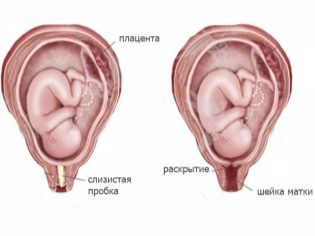9 week of pregnancy: discharge and pain in the lower abdomen
At the initial stage of carrying a child, a woman may experience various sensations.
How is obstetric term determined?
The calendar method, which is often used by future mothers, is very different from obstetric. So, 9 obstetric week of pregnancy corresponds to the seventh week after fertilization of the egg.
Doctors always determine the duration of pregnancy in obstetric weeks.
How does mother's belly change?
At 8-9 weeks of pregnancy, the woman begins to change shape. So, some future mothers say that they have a small tummy. It is usually noticeable in the case of multiple pregnancies and miniature women, because their belly grows faster.
During the first and second pregnancies, the size of the abdomen may be different.
It is practically impossible to “suspect” pregnancy in women with a normostenic or hypersthenic constitution at this time: they have a very small belly, and it is still almost impossible to see such changes at 8-9 weeks. Only some women have a slight rounded protrusion in the lower abdomen. - This is the edge of an enlarged uterus, it can be seen in pretty thin women.
Many future mothers are afraid to sleep on their stomachs, but the baby is still so small that during this period you can sleep in this position absolutely calmly.
The uterus at this time has a relatively small size. So, in size it is comparable to a large grapefruit. In the future, the uterus will continue to grow and rise higher, filling almost the entire pelvic area.
Types of vaginal discharge
At this stage of pregnancy, a woman may have biological fluid from the vagina, which may be due to both physiological and pathological causes. Discharges may vary in color, density and volume.
Light and beige highlights
Such vaginal discharge can be a variant of the norm at this stage of pregnancy. Also, the future mother may have liquid vaginal mucus from the genital tract. At the same time, such a vaginal discharge does not have a fetid odor.
Quite physiological reasons can lead to the occurrence of these secretions from the genital tract - changes in the hormonal background under the influence of progesterone. This specific hormone is increased in the female body immediately after conception.
Progesterone begins to act on the epithelial cells of the genital organs. This contributes to the fact that they begin to occur an active accumulation of glycogen. This substance is necessary to maintain the optimum pH of intimate organs.
Under the influence of glycogen, reproduction and development of beneficial microorganisms in the vagina occurs. It is necessary to maintain local immunity of the external genital organs. If this process is disrupted, then the expectant mother may develop adverse symptoms.
White cheesy discharge
These manifestations are, as a rule, a sign of candidiasis of the genital organs. This pathology is also called thrush and is caused by the special yeast-like fungi Candida. A striking symptom of vaginal candidiasis is the appearance of white discharge, in appearance that resembles cottage cheese flakes. The mucous membrane of the vagina at the same time becomes reddish and swollen.
A characteristic symptom is also the appearance of itching in the intimate area, the severity of which may be different. So, it can lead to significant discomfort for the future mother.
When the adverse symptoms of candidiasis appear, it is very important for the expectant mother to immediately contact her doctor. Delay with treatment is not worth it. This can only contribute to the progression of adverse symptoms.
To carry out treatment at home is not worth it. Incorrectly chosen drugs can worsen the course of the disease, and some of the medicines can harm the baby. To carry out the treatment is and an experienced and qualified specialist.
Bloody issues
The appearance of the bloody discharge from the genital tract future mother should not ignore. In each case, it is imperative to establish the reason that caused its occurrence.
Some women report that they have drops of blood on their underwear after having sex or having a transvaginal ultrasound. Panic should not be. As a rule, these symptoms completely disappear in a couple of days. In order for these adverse pink or red secretions to disappear, The expectant mother should limit intensive exercise and not lift heavy objects.
If after intercourse a woman notices the appearance of bloody discharge every time, she should consult with her obstetrician-gynecologist.
The doctor must determine the state of the reproductive organs and the baby. If for some reason sexual activity should be limited, he will definitely warn the expectant mother about it.
In some cases, a scarlet blood discharge may appear in a pregnant woman. As a rule, this is a very unfavorable clinical sign. The intensity of the color of such secretions can be different - from pink to bright crimson.
If these symptoms develop suddenly and are accompanied by severe pain in the lower abdomen, this may be a manifestation of a sudden miscarriage. In this situation, the future mother is extremely important to seek help from doctors.
Brown discharge
The reasons that can lead to the development of such vaginal discharge may be different. So, dark "daub" from the genital tract can develop in women with different pathologies of the cervix. Inflammatory or traumatic pathologies of the cervical canal may also lead to the appearance of light brown and dark vaginal discharge.
It is extremely unfavorable if they are accompanied by the appearance of pain in the lower abdomen. If these clinical signs of a future mother appeared suddenly and are increasing, she should definitely visit her doctor.
In order to determine the cause that caused the future mother to have such a vaginal discharge, the doctor must conduct a clinical examination. To do this, he will do an examination on a gynecological chair and, if necessary, will recommend the expectant mother to undergo an ultrasound examination. A more informative method of research on this period is transvaginal ultrasound.
Yellow discharge
The appearance of yellowish discharge with an unpleasant and even fetid odor may be a sign of a bacterial infection. Pathogenic microbes that penetrate the genital tract lead to their development.
A pronounced bacterial process can contribute to the fact that the expectant mother will increase body temperature and worsen the overall health.In this case, the appointment of antibacterial drugs is required to eliminate the adverse symptoms. They are prescribed only by a doctor.
About mucus plug
By this time of pregnancy in the body of the future mother, a special formation appears, which is called a mucus plug. It is necessary in order to protect the uterine cavity from the penetration of various pathogenic microorganisms into it, as well as from the influence of external factors. This mucous formation will be present in the genital tract almost until the onset of labor.
What are the sensations in the stomach?
Many women at this stage of pregnancy notice the appearance of various discomfort symptoms. So, the expectant mother may feel that she has a lower abdomen or pain, which is caused by an increase in the size of the uterus under the influence of the actively growing baby.
If a woman feels that she has a bad stomach ache, she should consult her obstetrician-gynecologist for advice. The doctor will be able to determine whether this condition is the norm or the result of any pathology.
The appearance of pain in the lower abdomen is usually caused by hypertonicity of the uterus. This condition is accompanied by increased contraction of the uterine walls. Hypertonus can be a dangerous condition, as it increases the possibility of spontaneous abortion.
In order for the uterine wall tone to remain normal, the expectant mother should carefully monitor her daily routine. A pregnant woman should rest in time and not overwork. Good functioning of the future mother's nervous system also contributes to a full sleep. To do this, a woman should sleep at least 8-8.5 hours a day.
The tone of the uterus is a dynamic indicator, and hypertonus can be replaced by the normal tonus. This clinical parameter of the uterus of the doctor is regularly monitored. If the expectant mother constantly feels severe pain in the lower abdomen or cramping pain, she should always consult her doctor.
About what happens in the body at the 9th week of pregnancy, look in the next video.






